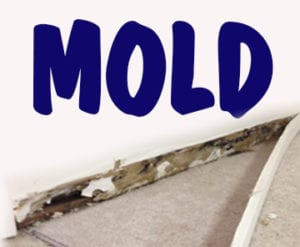 The most important thing a landlord can do to prevent problems related to mold is to respond rapidly to any complaints by the tenants of water intrusion. Even if the issue appears to be minor, it is important to be proactive. The quicker the moisture is removed the less time mold has to form. Moreover, a quick response is helpful if the water intrusion gives rise to a lawsuit. If the landlord responds immediately it is much harder for the tenant to argue that the landlord acted “unreasonably” in addressing the problem. Additionally, it is important that a rental property not contain signs of old and potentially untreated water intrusion. The reason for this is best demonstrated by the following hypothetical. Let’s say that a tenant becomes aware of a leak and sees that mold is growing as a result of this water intrusion. The tenant decides to sue the landlord claiming medical damages and in the course of suit tenant’s mold experts discover that there are signs of past leaks in the same general area where the mold is currently growing. The tenant’s lawyers will argue at trial that the fact that there were past leaks shows that the landlord knew this was an issue, did not fix it, and did not disclose it to the tenant. While it may be true that the landlord really did not know about these prior leaks, this is a powerful argument that the tenant can make
The most important thing a landlord can do to prevent problems related to mold is to respond rapidly to any complaints by the tenants of water intrusion. Even if the issue appears to be minor, it is important to be proactive. The quicker the moisture is removed the less time mold has to form. Moreover, a quick response is helpful if the water intrusion gives rise to a lawsuit. If the landlord responds immediately it is much harder for the tenant to argue that the landlord acted “unreasonably” in addressing the problem. Additionally, it is important that a rental property not contain signs of old and potentially untreated water intrusion. The reason for this is best demonstrated by the following hypothetical. Let’s say that a tenant becomes aware of a leak and sees that mold is growing as a result of this water intrusion. The tenant decides to sue the landlord claiming medical damages and in the course of suit tenant’s mold experts discover that there are signs of past leaks in the same general area where the mold is currently growing. The tenant’s lawyers will argue at trial that the fact that there were past leaks shows that the landlord knew this was an issue, did not fix it, and did not disclose it to the tenant. While it may be true that the landlord really did not know about these prior leaks, this is a powerful argument that the tenant can make
Now that we have established why it is important to react to notice of water intrusion quickly, the next logical question is what exactly should the landlord do? The first step is to notify your homeowners insurance. Often, this type of problem is covered by your policy and it is important to put them on notice as soon as possible. Then, in addition to repairing the leak, it is prudent to get mold testing done. There are a number of companies that conduct these tests. If the tests confirm any evidence of mold, then the testing company can create a remediation plan. The landlord should follow through to make sure that the remediation plan is completed.
The presence of mold is the type of problem that quickly leads to lawsuits. The general public is not well informed about the health risks associated with mold; as a result, tenants often fear the worst and quick to insight legal action. Therefore, when it comes to water intrusion, landlords are well advised to be proactive and overly cautious.





